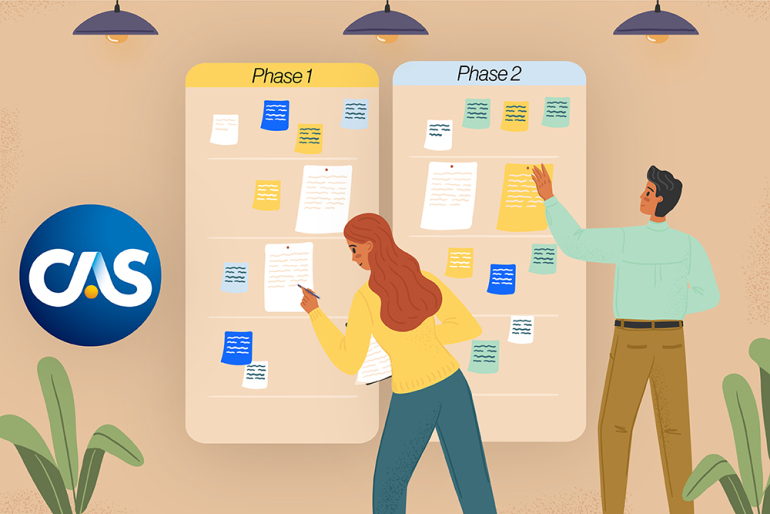CAS Board Adopts Governance Task Force Phase 1 Recommendations

The CAS Board of Directors adopted a set of commitments to enhance our governance system to align with best practices for professional membership organizations during a recent Board meeting. These Board commitments are based on advice from an independent consultant with adaptations made by the Board’s Governance Task Force (now the Governance Committee). This first phase of the governance project establishes the groundwork for an enhanced governance framework and adjusts our approach to Board Committees. The second phase of the governance project is currently underway and details will be released for member comment as it develops.
In Phase 1 of the Governance Project, the CAS Board unanimously agreed to commit to the following:
- Focus on and demonstrate accountability to membership interests. Set and maintain clear Board and CAS operating organization performance standards/expectations (“governing policies”). Oversee the organization’s performance and ensure it is consistent with the Board’s established expectations.
- Train the current and future Board(s) on trends and best practices in association governance and roles and responsibilities of Board members. Continually evaluate the Board’s governance/leadership capabilities.
- Modify the Board Committees as follows:
- All committees that report to the Board will be called “Board Committees.”
- All Board Committees (except the Discipline and Nominating Committees) should have at least two current Board members and other committee members may be selected based on related experience and expertise. The CAS CEO and staff may be non-voting members of a Board Committee.
- Create a Governance Committee to support the efficient functioning of the Board with initial membership to be that of the Governance Task Force. All Board Committees should focus on strategic activities, so the Governance Committee will propose new charters and descriptions or, potentially, the removal of a Board Committee with reassignment of duties to another Board Committee and/or within the CAS operating structure.
- Create a committee to deal with executive performance managementand assign the following members: President (serves as Committee chair), President-Elect, Board Chair, and up to three other members who frequently work with the CEO.
- Create a Membership Linkage Task Force. The purpose of the Task Force will be to propose a plan for improved communication from and to members regarding Board projects and activities.
- Create an Annual Board Work Plan. The President (who will become the Board Chair) should lead the Board in establishing a work plan for the subsequent elective year.
- Monitor and oversee the Executive Council as the principal forum in which the CAS operational activities are coordinated and monitored, subject to policies adopted by the Board. Eliminate the Operational Oversight Council.
- Develop strategies, policies, and work plans consistent with the CAS being a member-driven, staff-empowered organization. Phase 2 will include an exercise to define “member-driven, staff-empowered organization,” with the definition to be exposed for member comment.
Having presented Phase 1 of the governance project to the Board, the new Governance Committee will now be presenting Phase 2 recommendations focused on the overall governance structure of the CAS, Board policies and procedures, and roles and responsibilities.
The Governance Committee thanks the members who responded to our initial invitation to provide comments on the recommendations. We heard from some members who expressed a desire to understand the changes under consideration in greater detail. As Phase 2 will include more impactful proposals, we will expose proposals for member comment with additional explanations of the background and motivation for the proposals, adjust proposals as needed, and present those revised proposals to the Board. If the adjustments are deemed significant, we will re-expose them before making a proposal to the Board.
Phase 2 is expected to address the following additional recommendations:
- Develop a Governing Policies Manual, setting forth clear performance expectations for its own work (consistent with the Constitution and Bylaws) and for the CEO/Executive Council.
- Develop an Agenda Planning Policy to ensure Board Members have an opportunity for agenda input, and to ensure content is limited to issues that clearly belong to the Board to decide, consider or monitor, or to otherwise inform/educate the Board.
- Develop an on-boarding protocol for training of new Board members.
- Document non-overlapping roles and responsibilities for Board members, the Past President, President, President-Elect, Vice Presidents, the Executive Council, and CEO/staff.
- Create a principle-based description articulating what a “member driven, staff empowered” organization means.
Thank you for your interest in the work of the Governance Committee, and please look for future updates and requests for member feedback on plans for changes to CAS governance in the coming months.
Please note that there is an opportunity to discuss governance changes with Board members at the upcoming Annual Meeting in Los Angeles. Members of the Board will be available during networking events throughout the meeting, with a dedicated timeslot from 7:00-7:50 a.m. on Wednesday, November 8 for a Board Member Meet and Greet at Continental Breakfast.
Governance Committee
Kris DeFrain, FCAS, Chair
Kathy Antonello, FCAS
Steve Belden, FCAS
Justin Brenden, FCAS
Victor Carter-Bey, D.M.
Todd Lehmann, FCAS
Roosevelt Mosley, FCAS
Yvonne Palm, FCAS
Todd Rogers, CPA, CAE
